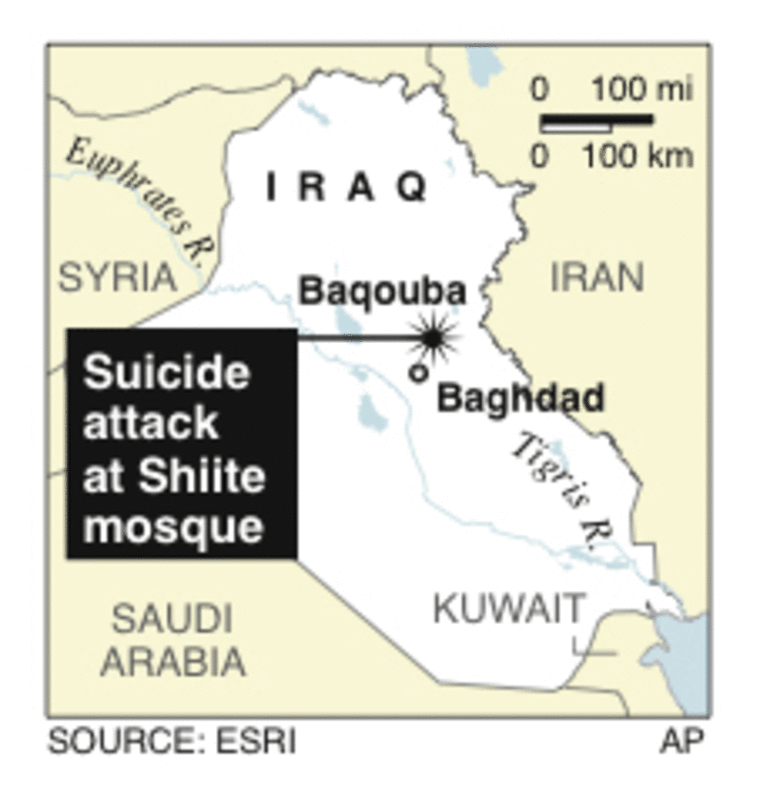A suicide bomber struck Shiites as worshippers prepared Thursday for their most important holiday, Ashoura, killing 11 at a mosque in violent Diyala province northeast of Baghdad — one day after a similar attack by a woman in a nearby village.
Police and eyewitnesses said one of the victims had intercepted the bomber when he saw him making his way through the crowd to the mosque. Shouting "stranger, stranger," he grabbed the bomber, who instantly blew himself up.
The surge in bomb attacks in recent weeks is beginning to slowly chip away at the significance of security gains made over the past six months, when levels of violence dropped considerably nationwide. Prime Minister Nouri al-Maliki's government has cited this as its biggest achievement after nearly two years in office.
The latest bombing came as authorities stepped up security across much of Iraq to try to prevent more Sunni insurgent attacks against Shiites. In Baghdad, a 48-hour ban on heavy vehicles went into effect at dusk, and Iraqi army troops and police were out on the streets in greater numbers.
Soldiers at the hundreds of checkpoints across the city were conducting particularly thorough searches, with many vehicles ordered to pull over for inspection and identification checks. The heaviest security operation, however, was in the holy city of Karbala south of Baghdad, where some 30,000 troops were deployed to ensure the safety of hundreds of thousands performing Ashoura rites.
Ashoura processions are frequent targets
Sunni Arab militants have repeatedly targeted Ashoura processions, with hundreds killed by mortar shelling or car bombings since 2003. Ashoura commemorates the death in a 7th century battle of Imam Hussein, one of Shiite Islam's most revered saints. His tomb is in Karbala, about 60 miles from Baghdad.

Ashoura is essentially a mournful occasion, but Iraq's majority Shiites have used it since the 2003 ouster of Saddam Hussein's Sunni-led regime to put on a show of force underlining their new status as the country's dominant group after decades of oppression. Hundreds of thousands march to Karbala or organize processions in their hometowns.
Militant Sunnis look upon Ashoura with contempt. They believe some of its rituals, like self-flagellation and the use of images, amounts to pagan worship and violates Islamic teachings.
Thursday's bombing took place in the Shiite neighborhood of Shafta on the southern outskirts of Baqouba, Diyala's provincial capital, 35 miles from Baghdad.
The bomber detonated his explosives among crowds of Shiites at the door of the mosque, targeting men beating their chests just outside, a police official said, speaking on condition of anonymity because he feared reprisals.
The attack killed 11 people and wounded 15, according to hospital officials.
"Such a painful event will not deter us from continuing Ashoura ceremonies," said a witness, who referred to himself only as Abu Salam. "We do not want further Shiite-Sunni strife in our area."
Second attack in two days
It was the second deadly suicide attack against Ashoura crowds in two days in Diyala, now one of Iraq's most violent provinces, where U.S. and Iraqi troops are fighting to dislodge al-Qaida in Iraq militants.
Wednesday's bombing, in a Shiite village nine miles south of Baqouba, was carried out by a female suicide bomber who struck black-clad worshippers preparing for Ashoura. Nine people were killed.
Ashoura observances have been going on for about a week and are scheduled to climax Friday night through midday Saturday.
Baghdad, where the Shiites' slight majority has significantly increased since 2003, was filled Thursday with Shiite banners and poster images of Imam Hussein, the saint. The images were hoisted on streets, stores, government buildings, tens of thousands of homes and even date palms and light poles.
A narrow roll of black cloth hung from the top floor down to street level at the 10-story headquarters of the Baghdad city government, formerly the Saddam-era information ministry.
Rice, lamb and black tea sweetened with sugar were served free of charge in colorful tents erected on quiet streets in Shiite as well as mixed neighborhoods under the protection of Iraqi troops and police. Shiite hymns narrating the death of Imam Hussein in the Karbala battle blared from giant speakers in many parts of the city.
30,000 troops to protect worshippers
In Karbala, Brig. Raed Shawkat, the police chief, said Iraqi helicopters were supporting the 30,000 troops already deployed in the city and in groves and deserts surrounding it. About 300 snipers have taken position on rooftops close to the shrine of Imam Hussein and the nearby tomb of his brother Abbas, he told reporters.
With al-Qaida's recent use of female suicide bombers — four in Diyala in the past three months — authorities deployed 500 policewomen in Karbala to search female pilgrims.
The U.S. military said Thursday that there was a second major wave of air strikes in a week against al-Qaida in Iraq positions southeast of Baghdad. It said 10,000 pounds of munitions were dropped Wednesday on what it said were bunkers used by the terrorist network as training sites.
The strikes came six days after warplanes dropped 40,000 pounds of munitions on al-Qaida positions in the same area in one of the most intense air raids since the Iraq war began in 2003.